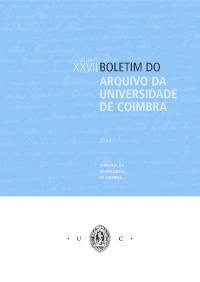Please use this identifier to cite or link to this item:
https://hdl.handle.net/10316.2/32839| Title: | A Imprensa da Universidade de Coimbra: estrutura orgânico funcional e análise do contexto de produção e fluxo documental e informacional durante a administração do Doutor Joaquim de Carvalho (1921‑1934) | Other Titles: | The Press of the University of Coimbra: organic and functional structure and analysis of the document production context and informational flow during the administration of Dr. Joaquim de Carvalho (1921‑1934) | Authors: | Nogueira, Cristina Luísa Tavares Ázar, Ana Lúcia Silva |
Keywords: | Imprensa da Universidade;Estrutura orgânico‑funcional;Fluxo informacional | Issue Date: | 2014 | Publisher: | Imprensa da Universidade de Coimbra | Abstract: | The Press of the University of Coimbra was founded in 1772, and was
abolished in 1934, during the Estado Novo regime. As part of the University
of Coimbra, it had a key role in the printing production, publishing and
dissemination of works of literary and scientific.
This case study discusses in general the institution, with focus to the period
of 1921‑1934,
corresponding to the administration of Dr. Joaquim de
Carvalho. It presents the characterization of that institution, including the
organic and functional analysis of their custodial and archival history and
structure, underlying the context of production and documentary and
informational flow.
This work reinforces the importance of these kind of studies for the archival
and information science, mainly the relevance that has either the intellectual
processing of documentation in cases like this, where the documentation
was not subject of archival classification, or in understanding the
organizational structure ‑
functional and informational flow of such
organizations. In the scope of this study, the analysis of document flow
revealed it was a bureaucratic institution where almost all procedures and
activities resulted in the production of documents; additionally, the
informational flow was very controlled since it was required controlling all
revenues and costs from the printed editions. A Imprensa da Universidade de Coimbra foi fundada em 1772 e extinta em 1934, durante o regime do Estado Novo. Agregada à Universidade de Coimbra, teve um papel fundamental na produção tipográfica, editorial e na difusão de obras de carácter literário e científico. O presente estudo de caso aborda de uma forma geral a instituição, incidindo em termos de amostra sobre o período de 1921 a 1934, correspondente à administração do Doutor Joaquim de Carvalho. Apresenta, de forma introdutória, a caraterização daquela instituição, do ponto de vista histórico, orgânico‑funcional, custodial e arquivístico, e, particularmente, o contexto de produção e o fluxo documental e informacional. Reforça a importância deste género de estudos para a Arquivística e Ciência da Informação, sobretudo pela pertinência, quer no tratamento intelectual de documentação desta natureza, quer na compreensão da estrutura orgânico‑funcional e do fluxo informacional deste tipo de organizações. Entre os principais resultados destacam‑se: a análise do fluxo documental no período estudado revelou uma instituição bastante burocrática onde quase todos os procedimentos e atividades resultavam na produção de documentos, e um fluxo informacional bastante controlado em virtude da necessidade de contabilização de custos e receitas inerentes às edições produzidas. |
URI: | https://hdl.handle.net/10316.2/32839 | ISSN: | 2182-7974 | DOI: | 10.14195/2182-7974_27_7 |
| Appears in Collections: | Boletim do Arquivo da Universidade de Coimbra |
Files in This Item:
| File | Description | Size | Format | |
|---|---|---|---|---|
| bauc27_artigo7.pdf | 4.65 MB | Adobe PDF |  |
Items in DSpace are protected by copyright, with all rights reserved, unless otherwise indicated.
